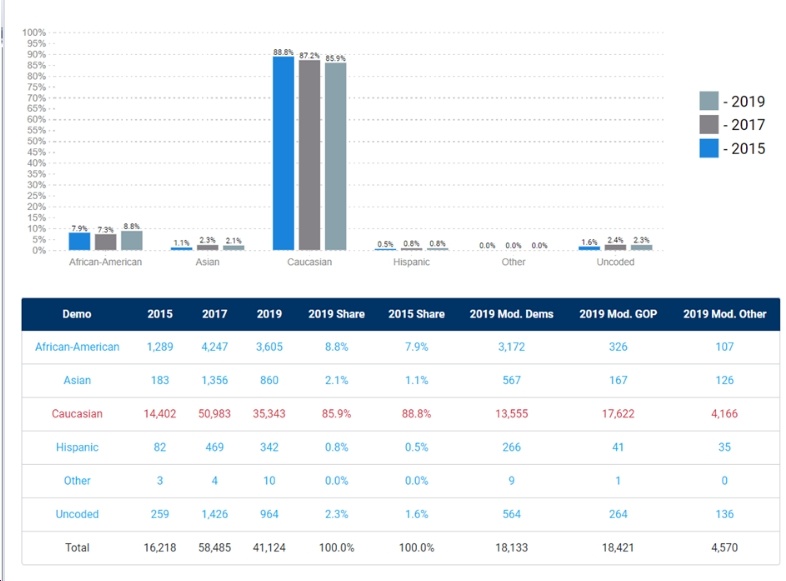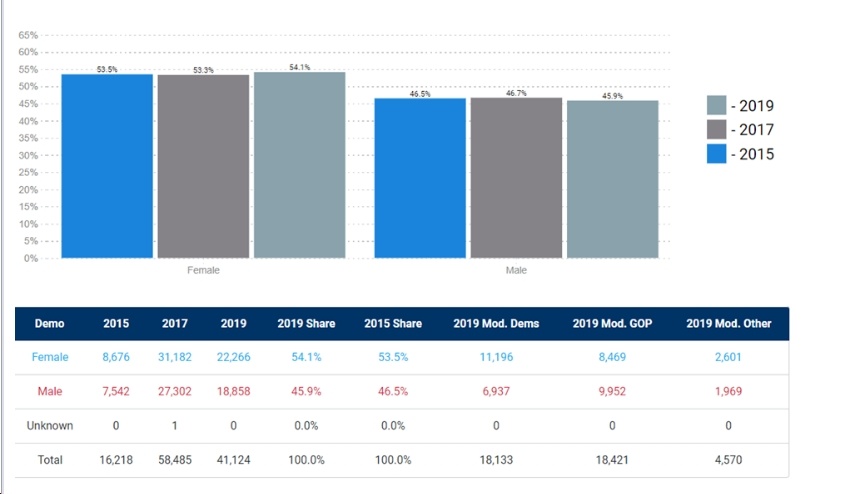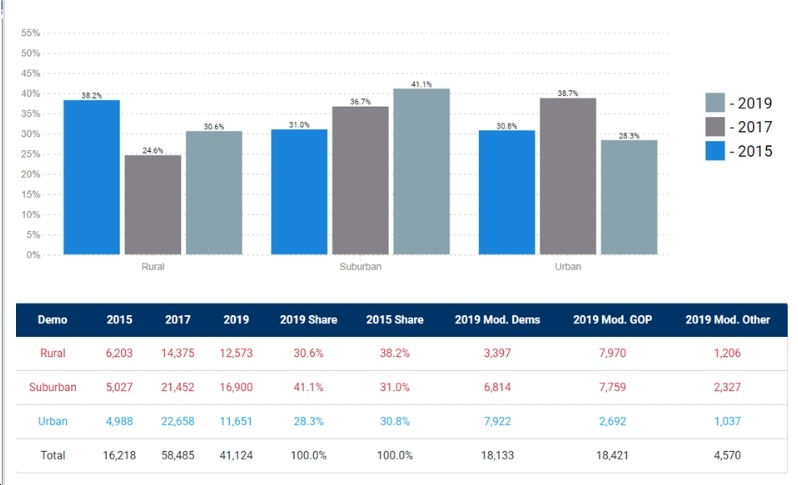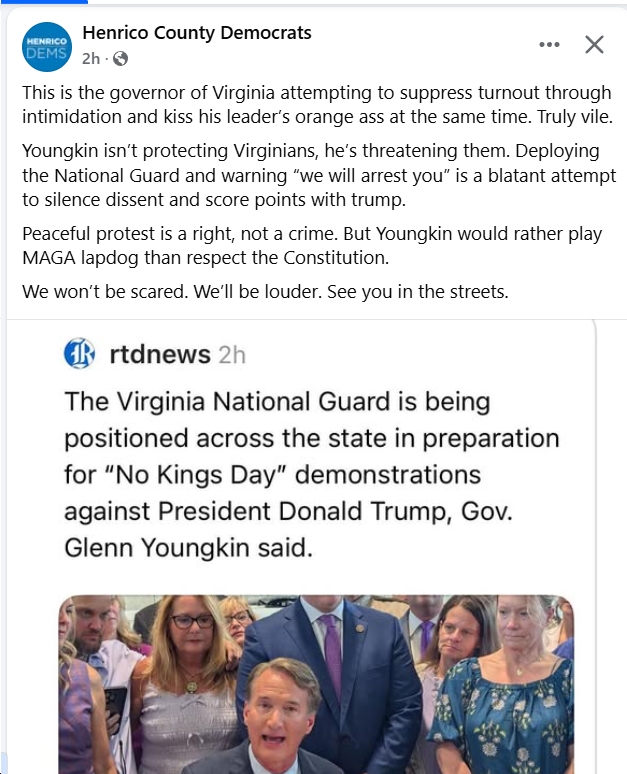See below for an interesting analysis of the early vote in Virginia so far, by Tyler Cherry of SKDKnickerbocker TargetSmart. Click on the graphics to enlarge. Note that the comparison to Virginia’s 2015 elections is apples-to-apples, as that was the last “off/odd” election year in the Commonwealth.
P.S. I’d argue that SD13 (Democrat John Bell vs. far-right Republican Geary Higgins) is the #1 or #2 most winnable – and MUST winnable! – State Senate race for Dems on 11/5. It certainly should be included in this list (and SD39 shouldn’t be, as it’s not at all competitive). I’d also include SD17 (Democrat Amy Laufer vs. Republican Sen. Bryce Reeves), SD28 (Democrat Qasim Rashid vs. Republican Sen. Richard Stuart), SD11 (Democrat Amanda Pohl vs. right-wing Republican Sen. Amanda Chase)…
Hi –
Ahead of Virginia’s elections, I wanted to share a new analysis of what the early vote in VA looks like, compiled by leading voter data firm TargetSmart using its one-of-a-kind interactive dashboard. TargetEarly’s dashboard not only has early vote counts updated daily, but also breaks it down by Senate District, so we can see what competitive districts’ early vote returns look like compared to ’17 and ’15. The full analysis is here and below, but here are some key highlights in some competitive Senate districts. Thank you for considering – happy to connect you with folks from TargetSmart if you’re interested in covering the early vote ahead of the Nov. 5 elections!
The data show that early vote returns in the state are lagging behind early vote returns at this point in 2017 (when there was a gubernatorial race atop the ticket), but are more than double the rate of returns at this point in 2015. Our analysis shows that younger (18-29) and older (65+) voters have increased their early vote share compared to 2015 and 2017, while all other age groups have decreased theirs — suggesting that younger voters are becoming increasingly involved in the early vote process.
Additionally, the TargetEarly dashboard breaks down early vote returns by Senate District. An analysis of the top Senate swing districts reveals:
- Senate District 39, currently held by Democrat George Barker
- Voters aged 18-29 and older voters aged 65+ have increased their early vote vote share compared to 2017
- All race demographics except for Caucasian voters have decreased their early vote shares compared to 2017
- Senate District 7, with no incumbent running but currently held by Republicans
- All age groups except 50-64 year olds have increased their early vote share compared to 2017
- African-American voters have nearly already surpassed their 2017 total early vote returns, suggesting that these voters will have significant influence in this race
- Senate District 8, currently held by Republican Bill DeSteph
- Voters aged 18-29 and older voters aged 65+ have increased their early vote vote share compared to 2017
- Though an overwhelmingly white district, African-American voters have nearly already surpassed their 2017 total early vote returns
- Senate District 10, currently held by Republican Glen Sturtevant
- Voters aged 18-29 and older voters aged 65+ have increased their early vote vote share compared to 2017
- Though an overwhelmingly white district, African-American voters have nearly already surpassed their 2017 total early vote returns
+++
Virginia Early Vote: Young, Suburban Voters Increasing Early Vote
All eyes turn to Virginia ahead of its statewide elections on November 5th, where all 40 seats in the state Senate and 100 seats in state House of Delegates are up for re-election. Despite Virginia’s long history as a battleground state, it has trended blue in recent years, most notably in 2017 when Democrats flipped 15 seats in its 100-member House of Delegates and Democratic Governor Ralph Northam won by an unexpectedly wide margin. Many understood Virginia’s 2017 elections to be a rebuke of President Trump and a harbinger for what was to come across the country in the 2018 midterms. With 2020 on the horizon, attention will turn to Virginia once again — and the early vote may give us a clue of where this year’s elections are headed.
A new TargetSmart analysis using data from our TargetEarly dashboard — which tracks and updates early vote returns in live-time — shows that early vote returns in the state are lagging behind early vote returns at this point in 2017 (when there was a gubernatorial race atop the ticket), but are more than double the rate of returns at this point in 2015. Our analysis shows that younger (18-29) and older (65+) voters have increased their early vote share compared to 2015 and 2017, while all other age groups have decreased theirs — suggesting that younger voters are becoming increasingly involved in the early vote process.
Additionally, the TargetEarly dashboard breaks down early vote returns by Senate District. An analysis of the top Senate swing districts reveals:
- Senate District 39, currently held by Democrat George Barker
- Voters aged 18-29 and older voters aged 65+ have increased their early vote vote share compared to 2017
- All race demographics except for Caucasian voters have decreased their early vote shares compared to 2017
- Senate District 7, with no incumbent running but currently held by Republicans
- All age groups except 50-64 year olds have increased their early vote share compared to 2017
- African-American voters have nearly already surpassed their 2017 total early vote returns, suggesting that these voters will have significant influence in this race
- Senate District 8, currently held by Republican Bill DeSteph
- Voters aged 18-29 and older voters aged 65+ have increased their early vote vote share compared to 2017
- Though an overwhelmingly white district, African-American voters have nearly already surpassed their 2017 total early vote returns
- Senate District 10, currently held by Republican Glen Sturtevant
- Voters aged 18-29 and older voters aged 65+ have increased their early vote vote share compared to 2017
- Though an overwhelmingly white district, African-American voters have nearly already surpassed their 2017 total early vote returns
Virginia Early Vote Returns by Age
Thus far, every age group has more than doubled its early vote returns, compared to this point in 2015. 18-29 year olds already comprise a higher share of the early vote (10.6 percent) now compared to 2017 (10.2 percent). That age group and voters aged 65+ are the only age groups to increase their early vote share compared to 2017, while all other age groups comprise a smaller share of the early vote return compared to 2017.
Virginia Early Vote Returns by Race
Similarly, every racial demographic has more than doubled its early vote returns, compared to this point in 2015. African-American and Hispanic voters comprise a higher share of early vote returns compared to 2017, while Caucasian voters have decreased their share (85.9 percent compared to both 2015 (88.8 percent) and 2017 (87.2 percent) — evidencing that voters of color are increasingly participating in the early vote process.
Virginia Early Vote Returns by Gender
Women have historically held a higher share of the early vote than men in Virginia, a trend that is holding in this election as well. Of note, African-American women have almost already surpassed their raw early vote totals compared to all of 2017, suggesting that that demographic may hold significant influence in this election.
Virginia Early Vote Returns by Urbanicity
Suburban voters have dramatically increased their early vote share, from 31 percent in 2015 to 37 percent in 2017, and currently to 41 percent. Rural voters have increased their early vote vote share (31 percent) compared to 2017 (25 percent), while urban voters have significantly decreased their early vote vote share (28 percent) compared to 2017 (39 percent).


















